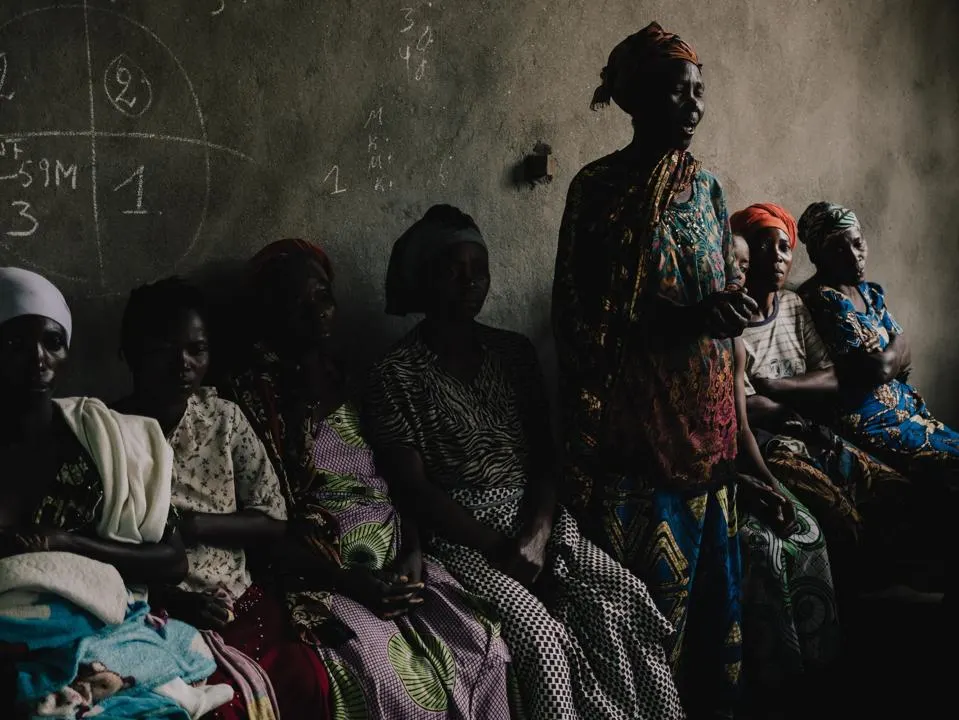Displaced community members who have fled the M23 conflict speak during a Doctors Without Borders ..Getty Images
On October 31, 2024, Dr Denis Mukwege, a world-renowned gynecologist, human rights activist and Nobel Peace Prize laureate from east Congo, addressed the U.K. Parliament testifying before a newly launched inquiry into conflict-related sexual violence (CRSV) in the Democratic Republic of Congo (DRC).
As he emphasized, “During the last decades of continued war and instability, our country has been subject to repeated wars of aggression by neighboring countries, including Rwanda and Uganda. Women and girls have paid and continue to pay a very heavy price in this forgotten war and neglected crisis.”
The issue of CRSV in the DRC is not a new problem, but one that has been enjoying impunity for decades. Dr Mukwege can testify to this having treated thousands of victims/survivors of the crime. Indeed, since the establishment of the Panzi Hospital in 1999, Dr Mukwege treated more than 83,000 victims/survivors.
Despite awareness raising and some steps taken to combat impunity, CRSV in the DRC persists to this day. As emphasized by Dr Mukwege, in 2023, “more than 123,000 cases of gender-based violence (GBV) were reported, a 300% increase in only three years, and over 61,000 victims have been treated by humanitarian partners in the first half of the year 2024.
This represents one victim every four minutes.” Dr Mukwege added that “Even though [these numbers] are extremely shocking, they represent only the tip of the iceberg, as many places affected by the ongoing conflict remain inaccessible for health and humanitarian aid workers, and many victims died or are too traumatized to talk and seek much needed support and care.”
This spike is attributed to the escalation of armed violence since 2021 resulting from the resurgence of M23 rebel armed group and the Rwandan Defense Forces (RDF).While the DRC has laws criminalizing sexual violence, implementation continues to be a challenge.
Furthermore, as Dr Mukwege explained, “Shame, silence, stigmatization, and fear of reprisals too often prevent women from filing a complaint. On top of these obstacles, the lack of confidence in State institutions, particularly in the justice system, dissuades many Congolese victims from filing complaints and often leads them to resort to friendly settlements under local customary law.”
Dr Mukwege mentioned some efforts to combat impunity. Among others, on July 27, 2018, the DRC High Military Court upheld the conviction of 11 men, including a provincial deputy, found guilty in December 2017 of crimes against humanity for the rape of dozens of young children and girls and for murders in the village of Kavumu, 25 km from Bukavu.
On May 15, 2023, the Military Tribunal of Uvira sentenced Munyololo Mbao, alias Ndarumanga, former leader of a faction of the Raia Mutomboki armed group in the DRC, to life imprisonment for crimes against humanity. Among the charges confirmed by the court are the crime of murder, torture, rape, sexual slavery as well as forced pregnancy, which constitutes a historic precedent before a national court.
Nonetheless, access to justice remains very limited, if not nonexistent, for most victims/survivors. Mr Mukwege made several recommendations on how to address the issue of justice and accountability, including by expanding mobile courts and other community-based justice mechanisms, with increased funding and long-term sustainability plans. These initiatives should be supported by robust witness protection programs to ensure the safety of victims/survivors and their families.
Furthermore, Dr Mukwege indicated that: “Congolese men and women also have the right to their Nuremberg. This is why we are advocating alongside victims and survivors for the establishment of an International Criminal Tribunal for Congo and/or mixed specialized chambers. The high level of involvement of foreign armies on Congolese territory, the international or internationalized dimension of the conflicts and of the crimes committed in the DRC require an international and/or internationalized response from justice.”
Dr Mukwege added: “All levels of responsibility – national, regional and international – must be established, and Rwanda and Uganda must be held accountable for their repeated violation of international law and human rights, their destabilization activities as well as their leading roles in the plundering of natural and mineral resources and the commission of international crimes committed in the DRC. Coordinated international sanctions of the United Nations, the United States, the European Union and the UK, and legal action should be considered against individuals and entities authors or complicit in these crimes.”
As Dr Mukwege stated, the responses must ensure the restoration of the dignity of victims of CRSV. However, as he also added, victims/survivors are provided with very little assistance. He mentioned conversations with victims/survivors who were not able to leave their shelters due to lack of clothing.
In light of the dire situation in the DRC, the new ad-hoc inquiry, led by cross-party British Parliamentarians aims to hear from victims/survivors and organizations helping them, and experts, and identify recommendations for the U.K. Government and other states. Over the next months, the inquiry will accommodate oral testimonies, as accompanied by a call for written submissions.
As the situation in the DRC continues to be neglected by the international community, more needs to be done to shine a light on the evidence of the crimes, and to drive comprehensive responses. Dr. Ewelina U. Ochab, Forbes






